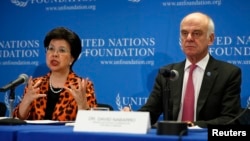The World Health Organization has agreed to fast track several potential treatments for Ebola in an effort to stop the spread of this deadly disease in West Africa. After two days of meetings, more than 200 participants, including experts from the Ebola-affected countries, have agreed that work on several promising therapies and vaccines should go ahead at an accelerated pace.
Experts attending World Health Organization meetings agree the usual rules that govern clinical trials of untested drugs and vaccines make no sense in the case of Ebola. They say the speed with which the disease is spreading throughout West Africa demands a rapid response.
WHO reports more than 2,000 people in Liberia, Sierra Leone, and Guinea have died from this deadly virus, more than 40 percent in the last three weeks. Some 3,500 cases have been confirmed in West Africa.
Given this health crisis, WHO Assistant Director-General Marie-Paule Kieny says the development of treatments is moving with unprecedented speed, while trying to preserve safety.
“The protocol in Mali, for example has been approved in a matter of days. With any other clinical trial that I know of, you would talk about weeks and months. So, there is clearly, the timelines change of all the processes that we know for this particular Ebola outbreak," said Kieny.
Clinical trials on two promising candidate vaccines are beginning in the United States. WHO reports phase one clinical trials of these vaccines are set to begin in Mali at the end of this month or early October with 40 participants between the ages of 18 and 50. Similar trials will follow in Britain soon after.
Dr. Kieny says the initial data on the safety of these vaccines will be available in November. Immediately after that, she says, the vaccines will start to be rolled out. She says health care workers and other front line staff will be the first people to be vaccinated.
She notes one of the most promising treatments is the use of blood transfusions from recovered Ebola patients.
“There is a real opportunity that a blood-derived product can be used now and this can be very effective in terms of treating patients…With the very negative point that we have so many patients, the one positive point is that there are also many people now who are convalescent who survived and who are doing well. And, these people can provide blood, can provide then serum also in order to have something to treat the other people who are sick now," she said.
The experts discussed the availability and evidence supporting the possible efficacy of therapeutic drugs. They also considered the potential use of existing drugs approved for other diseases and conditions. Some drugs, which have shown great promise in monkey models, have been used in a few Ebola patients.
A few patients who were treated with the drug Zmapp have recovered, but several others have died. So, the efficacy of this drug is yet to be proven. Supplies of Zmapp have been exhausted.
Dr. Kieny says pharmaceutical companies are working to expand production as quickly as possible. She says that as soon as more supplies become available, regulated trials will be conducted to see if this treatment works.











